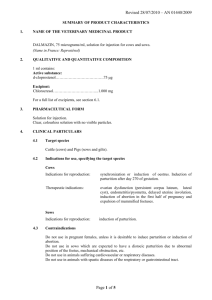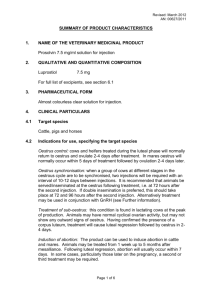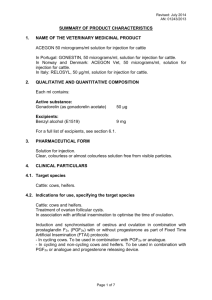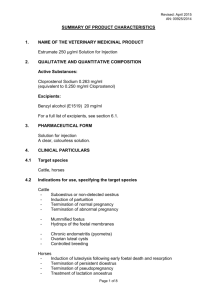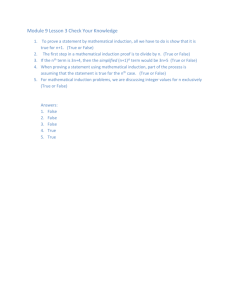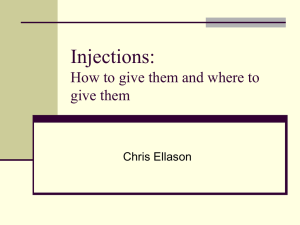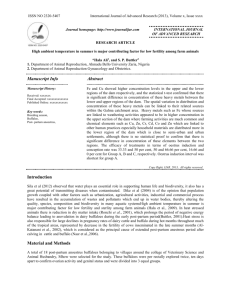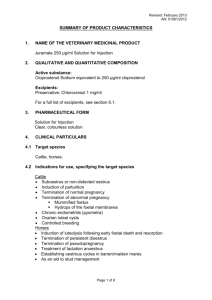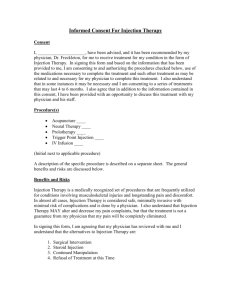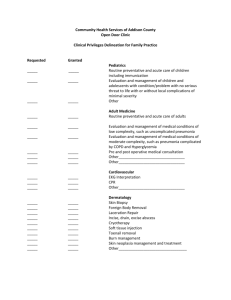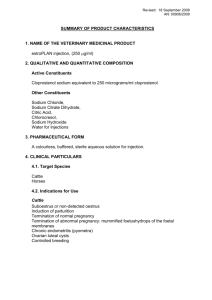SPC
advertisement
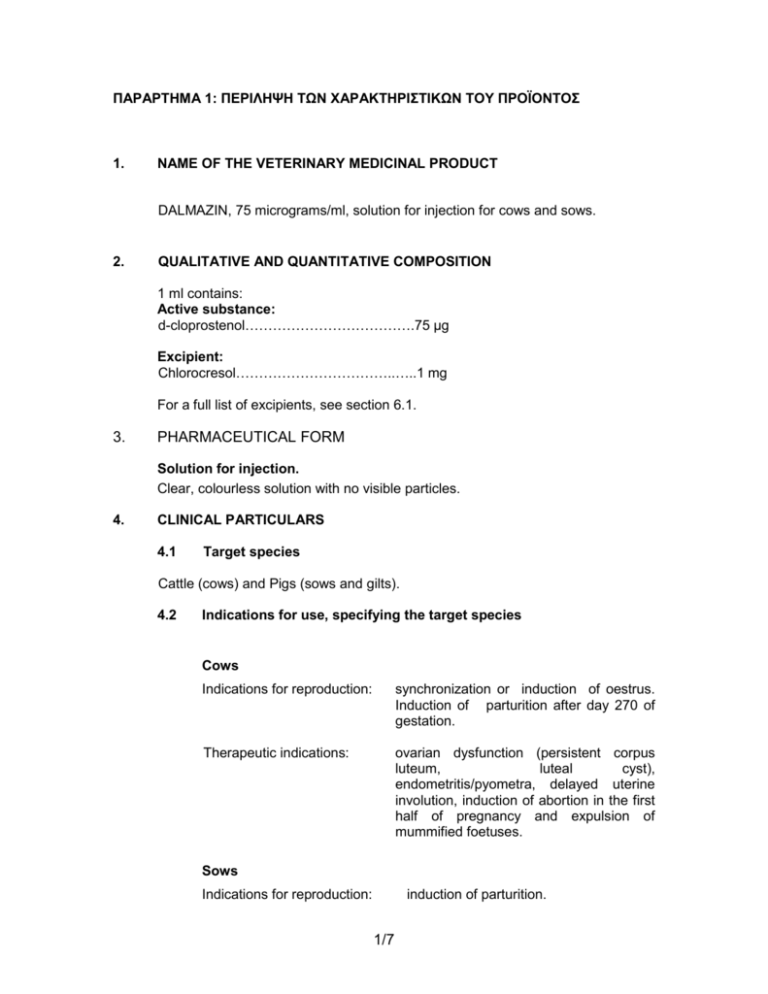
ΠΑΡΑΡΤΗΜΑ 1: ΠΕΡΙΛΗΨΗ ΤΩΝ ΧΑΡΑΚΤΗΡΙΣΤΙΚΩΝ ΤΟΥ ΠΡΟΪΟΝΤΟΣ 1. NAME OF THE VETERINARY MEDICINAL PRODUCT DALMAZIN, 75 micrograms/ml, solution for injection for cows and sows. 2. QUALITATIVE AND QUANTITATIVE COMPOSITION 1 ml contains: Active substance: d-cloprostenol……………………………….75 μg Excipient: Chlorocresol……………………………..…..1 mg For a full list of excipients, see section 6.1. 3. PHARMACEUTICAL FORM Solution for injection. Clear, colourless solution with no visible particles. 4. CLINICAL PARTICULARS 4.1 Target species Cattle (cows) and Pigs (sows and gilts). 4.2 Indications for use, specifying the target species Cows Indications for reproduction: synchronization or induction of oestrus. Induction of parturition after day 270 of gestation. Therapeutic indications: ovarian dysfunction (persistent corpus luteum, luteal cyst), endometritis/pyometra, delayed uterine involution, induction of abortion in the first half of pregnancy and expulsion of mummified foetuses. Sows Indications for reproduction: induction of parturition. 1/7 4.3 Contraindications Do not use in pregnant females, unless it is desirable to induce parturition or induction of abortion. Do not use in sows which are expected to have a distocic parturition due to abnormal position of the foetus, mechanical obstruction, etc. Do not use in animals suffering cardiovascular or respiratory diseases. Do not use in animals with spastic diseases of the respiratory or gastrointestinal tract. 4.4 Special warnings for each target species None. 4.5 Special precautions for use Special precautions for use in animals As with parenteral administration of any substance, basic antiseptic rules should be observed. The injection site must be thoroughly cleaned and disinfected in order to reduce the risk of infection with anaerobic bacteria. Induction of labour before the 111th day of gestation may cause mortality in piglets and an increase in the number of sows that require manual assistance. Do not administer by intravenous route. Special precautions to be taken by the person administering the veterinary medicinal product to animals Prostaglandins of the F2 type can be absorbed through the skin and may cause bronchospasm or miscarriage. Care should be taken when handling the product to avoid self-injection or skin contact. Women of child-bearing age, asthmatics and people with bronchial or other respiratory problems, should avoid contact with, or wear disposable plastic gloves when administering the product. Accidental spillage on the skin should be washed off immediately with soap and water. In case of accidental self injection seek medical advice and show the label to the physician. Should shortness of breath result from accidental inhalation or injection, seek urgent medical advice and show the doctor this warning. Do no eat, drink or smoke while handling the product. 2/7 4.6 Adverse reactions (frequency and seriousness) Occurrence of anaerobic infection is likely if anaerobic bacteria penetrate the tissue of the injection site. This applies especially to intramuscular injection and in particular to cows. Typical local reactions due to anaerobic infection are swelling and crepitus at the injection site. When used in cows for induction of parturition and dependent on the time of treatment relative to the date of conception, the incidence of retained placenta may be increased. Behavioural changes seen after treatment for induction of farrowing are similar to those changes associated with natural farrowing and usually cease within one hour. 4.7 Use during pregnancy, lactation or lay Do not use in gestating animals unless it is desirable to induce parturition or therapeutic induction of abortion. 4.8 Interactions with other medicinal products and other forms of interaction Do not administer the treatment together with non-steroidal antiinflammatory drugs since they inhibit endogenous prostaglandin synthesis. The activity of other oxytocic agents can be increased after the administration of cloprostenol. 4.9 Amounts to be administered and administration route Cows Administer 2 ml of DALMAZIN, equivalent to 150 micrograms of dcloprostenol/animal by intramuscular route. Repeat after 11 days for the synchronisation of oestrus. The dose of 2 ml equivalent to 150 micrograms of d-cloprostenol/animal by intramuscular route can be repeated for the induction of oestrus and for the treatment of ovarian dysfunction, endometritis/pyometra and delayed uterine involution. In particular: Induction of oestrus (also in cows showing weak or silent heat): administer DALMAZIN after having established the presence of a corpus luteum (6-18th day of the cycle); heat usually appears within 4860 hours. Proceed, therefore, with insemination 72-96 hours after injection. If oestrus is not evident, administration of the product needs to be repeated 11 days after the first injection. Synchronisation of oestrus: administer DALMAZIN twice, with an interval of 11 days between each dose. Proceed therefore with two artificial inseminations at intervals of 72 and 96 hours from the second injection. 3/7 Induction of parturition: administer DALMAZIN after 270 days of pregnancy. Birth usually results within 30-60 hours of treatment. Mummified foetus: expulsion of the foetus is observed within 3-4 days after administration of DALMAZIN. Induction of abortion: administer DALMAZIN in the first half of pregnancy. Ovarian dysfunction (persistent corpus luteum, luteal cysts): administer DALMAZIN, then proceed to inseminate at the first oestrus after injection. If oestrus is not evident, conduct a further gynaecological examination, and repeat the injection 11 days after the first administration. Insemination must always be carried out 72-96 hours after injection. Endometritis, pyometra: administer DALMAZIN. If necessary repeat the treatment after 10-11 days. Delayed uterine involution: administer DALMAZIN and, if considered necessary, carry out one or two successive treatments at 24 hour intervals. Sows Administer 1 ml of DALMAZIN, equivalent to 75 micrograms of dcloprostenol/animal, by intramuscular route, not earlier than 112 days of pregnancy. Repeat after 6 hours. Alternatively, 20 hours after the initial dose of DALMAZIN, a myometrial stimulant (oxytocin or carazolol) may be administered. Following the protocol of the double administration, approximately 70-80% of the animals will give birth during the interval between 20 and 30 hours after the first administration. As with every prostaglandin-based product, injection in contaminated skin areas is to be avoided in order to reduce the risk of infection with anaerobic bacteria. The injection site must be thoroughly cleaned and disinfected before administration. 4.10 Overdose (symptoms, emergency procedures, antidotes), if necessary At 10 times the therapeutic dose, no adverse reactions were reported. In general, a large overdose could result in the following symptoms: increased pulse and breathing rate, bronchoconstriction, increased body temperature, increased amounts of loose faeces and urine, salivation and vomiting. As no specific antidote has been identified, in the case of overdose, symptomatic therapy is advisable. An overdose will not accelerate corpus luteum regression. 4/7 4.11 Withdrawal periods Meat and offal: Cattle: Zero days Swine: 1 day Milk: Zero hours (zero milkings) 5. PHARMACOLOGICAL PROPERTIES Pharmacotherapeutic group: prostaglandins ATC Vet Code: QG02AD90 5.1 Pharmacodynamic properties DALMAZIN is a sterile aqueous solution containing 75 micrograms/ml of dextrorotatory cloprostenol, a synthetic analogue of the prostaglandin F2. d-cloprostenol, the dextrorotatory enantiomer, constitutes the biologically active component of the racemic cloprostenol molecule and results in an approximate 3.5-fold increase in activity. Administered in the luteal phase of the oestrus cycle, d-cloprostenol induces functional and morphological regression of the corpus luteum (luteolysis) resulting in a sharp fall in progesterone levels. The increased release of the follicle stimulating hormone (FSH), induces the follicular maturation followed by signs of oestrus and by ovulation. 5.2 Pharmacokinetic particulars Pharmacokinetic studies demonstrate a rapid absorption of dcloprostenol. The peak blood level is reached a few minutes following intramuscular administration, as well as a rapid diffusion to the ovaries and uterus, the organs in which the maximum concentration is reached 10-20 minutes after administration. Following intramuscular administration of 150 micrograms of dcloprostenol in the cow, the peak plasma level (Cmax) of 1.4 micrograms/l is reached after approximately 90 minutes, while the elimination half life (t½) is in the order of 1 hour 37 minutes. In sows, a Cmax of approximately 2 micrograms/l is observed between 30 and 80 minutes following administration of 75 micrograms d-cloprostenol, with an elimination half life in the order of 3 hours 10 minutes. 6. PHARMACEUTICAL PARTICULARS 6.1 List of excipients chlorocresol ethanol sodium hydroxide anhydrous citric acid water for injections 5/7 6.2 Incompatibilities None known. 6.3 Shelf-life Shelf life of the veterinary medicinal product as packaged for sale: 3 years. Shelf life after first opening the immediate packaging: 28 days. 6.4 Special precautions for storage Do not store above 25°C. 6.5 Nature and composition of immediate packaging 2 ml, 10 ml, 20 ml vials in glass type I or type II, closed with a chlorobutyl rubber stopper with an aluminium overseal. Package sizes: one 2 ml vial + syringe fifteen 2 ml vials sixty 2 ml vials one 10 ml vial ten 10 ml vials one 20 ml vial five 20 ml vials Not all pack sizes may be marketed. 6.6 Special precautions for the disposal of unused veterinary medicinal products or waste materials derived from the use of such products Any unused veterinary medicinal product or waste materials derived from such veterinary medicinal product should be disposed of in accordance with local requirements. 7. MARKETING AUTHORISATION HOLDER FATRO S.p.A. - Via Emilia, 285 - Ozzano Emilia (Bologna), Italy. 8. MARKETING AUTHORISATION NUMBERS CY00077V 6/7 9. DATE OF FIRST MARKETING AUTHORISATION OR AUTHORISATION RENEWAL 30/4/2004, 22/11/2012 10. DATE OF REVISION OF THE TEXT 22/11/2012 7/7
